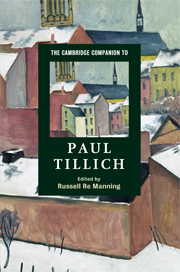Book contents
- Frontmatter
- Part I Standing within the theological circle
- 1 Tillich’s life and works
- 2 Tillich as systematic theologian
- 3 Tillich on God
- 4 Tillich’s Christology
- 5 Tillich’s theology of the concrete spirit
- 6 Faith (and religion)
- 7 ‘First, read my sermons’ Tillich as preacher
- Part II Theology of culture
- Part III Tillich in dialogue
- Bibliography
- Index
1 - Tillich’s life and works
from Part I - Standing within the theological circle
Published online by Cambridge University Press: 28 May 2009
- Frontmatter
- Part I Standing within the theological circle
- 1 Tillich’s life and works
- 2 Tillich as systematic theologian
- 3 Tillich on God
- 4 Tillich’s Christology
- 5 Tillich’s theology of the concrete spirit
- 6 Faith (and religion)
- 7 ‘First, read my sermons’ Tillich as preacher
- Part II Theology of culture
- Part III Tillich in dialogue
- Bibliography
- Index
Summary
Paul Tillich was born on 20 August 1886 in Starzeddel, Germany (today Starosiedle in Poland), where his father, Johannes Tillich, was a Lutheran minister. In 1890 the family moved to Schönflieb/Neumark (today Trzcinsko Zdríj in Poland), where Johannes Tillich was appointed to the post of chief pastor (Oberpfarrer) and district superintendent. From 1900 onwards the family lived in Berlin. The early death of Paul's mother Mathilde (neé Dürselen) in 1903 must have affected him deeply. / Tillich's intellectual formation: idealism and apologetics / Tillich's fascination with philosophy extends as far back as his final years at the Friedrich-Wilhelms-Gymnasium, and by the time he had completed his Abitur and matriculated in the Theology Faculty of the University of Berlin in the winter semester of 1904 he had already acquired a good knowledge of the history of philosophy, in particular Kant and Fichte. In the summer semester of 1905 he continued his studies in Tübingen. For the following four semesters he chose to go to the University of Halle, which at that time had a high reputation in theological circles. The most important theologian at Halle was Martin Kähler, who would exert a long-lasting influence on Tillich. While studying, Tillich joined the Wingolf Christian student fraternity and quickly came to the notice of his fellow members in virtue of his polished debating talents, as a result of which he was elected fraternity representative for the summer semester of 1907. After the end of the semester Tillich continued his studies in Berlin, and in autumn 1908 he passed his first examination in theology with the highest grade of 'Recht gut' ('Very good').
- Type
- Chapter
- Information
- The Cambridge Companion to Paul Tillich , pp. 3 - 17Publisher: Cambridge University PressPrint publication year: 2009
- 4
- Cited by

